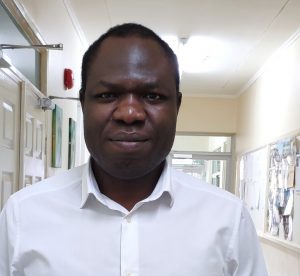Plenary Session 4: Crisis Reduction and Response and the Role of FAIR Data
Dec. 4, 2020, 11:00-13:00 (UTC)
To conclude the week, this double plenary session will explore the role of FAIR data in crisis reduction and response, with a specific focus on the COVID-19 pandemic.
The global sanitary crisis has demonstrated the importance of science-based policy, notwithstanding the complex interplay of science advice and policy in the context of multiple-criteria decision-making. The importance of accurate, real-time data sharing and rigorous scientific transparency have been underlined, and the realisation of these desiderata depends in turn on sound data stewardship and the FAIR principles.
The keynote from Prof. Antoine Flahault on ‘Precision Epidemic Forecasting using Critical Data’ will be followed by a panel discussing numerous aspects of the role of FAIR data in disaster risk reduction and response, covering epidemics and other hazards.
Speakers and abstracts
 Antoine Flahault
Antoine Flahault
Antoine Flahault is Director of the Institute of Global Health at the Université de Genève. He is MD and holds a PhD in biomathematics. He was appointed as full professor of public health in 2002. He was the founding director of the French School of Public Health (EHESP, Rennes, 2007-2012), co-director of Centre Virchow-Villermé for Public Health Paris-Berlin (Université Descartes, Sorbonne Paris Cité), co-director of the European Academic Global Health Alliance (EAGHA),and president of the Agency for Public Health Education Accreditation (APHEA).
He conducted research in mathematical modelling of communicable diseases, chaired the WHO collaborative centre for electronic disease surveillance, and coordinated research on Chikungunya in Indian Ocean (Inserm Prize, 2006; was scientific curator of a large exhibition Epidemik, la Cité des Sciences et de l’Industrie (Paris, Rio and Sao Paulo)). In January 2014, he was appointed as professor of public health at School of Medicine, University of Geneva where he is the founding director of the Institute of Global Health. He was elected corresponding member at Académie Nationale de Médecine (Paris). In January 2014, he had more than 235 scientific publication referenced in Medline.
During the COVID-19 pandemic, he has been a prominent scientific and epidemiological commentator, making the case for the specific, detailed and nuanced application of data and science in the response to the sanitary crisis.
Abstract: COVID-19: Precision Epidemic Forecasting using critical data
The world is facing its largest health crisis since a century. It is now coupled with social and economic burdens and it may lead to political turmoil in the coming future. However, the COVID-10 crisis bursts into a digitalized interconnected world we may take huge benefits from. Fluxes of real time data are abundant all over the world, and using quality data can be extremely useful to allow precision epidemic forecasting and improve our response to the crisis.
The Institute of global health in collaboration with the Swiss Data Science Centre (a joint initiative from the two Swiss engineering schools, EPFL and ETHZ) launched an open-access dashboard from the early beginning of the pandemic. It provides daily COVID-19 epidemic 7 day forecasting, covering 209 countries and territories worldwide. This work is analysed and published every day on Twitter and available on the internet. It informs scientists, policy makers and any cititzens on the crisis trends.
The mathematical theory of infectious diseases allows for guiding public policies in this pandemic to an extent which has never been seen in the past. The concept of reproductive rate with its threshold theorem have implications in terms of preventive measures, screening methods and herd immunity.
Appropriate use of data can inform and sometimes enlighten better control and response against the pandemic SARS-CoV-2.
URL of the Dashboard: https://renkulab.shinyapps.io/COVID-19-Epidemic-Forecasting/
 Peter Gluckman
Peter Gluckman
Sir Peter Gluckman trained as a paediatrician and biomedical scientist and holds a Distinguished University Professorship at the Liggins Institute of the University of Auckland. He also holds honorary chairs in University College London, University of Southampton and National University of Singapore (where he acts as chief science advisor to the Singapore Institute for Clinical Sciences). He has published over 700 scientific papers in perinatal and developmental physiology, neuroscience and endocrinology, evolutionary biology and medicine. He has authored both technical and popular science books. He chaired the WHO Commission on Ending Childhood Obesity (2014-2017).
Sir Peter is chair of the International Network of Government Science Advice (INGSA) and president-elect of the International Science Council (ISC). From 2009-2018 he was first Chief Science Advisor to the Prime Minister of New Zealand. He is also Science Envoy for the New Zealand Ministry of Foreign Affairs and Trade and coordinates the secretariat of Small Advanced Economies Initiative. He has written and spoken extensively on science-policy and science-diplomacy and science-society interactions.
He has received the highest scientific and civilian honours in New Zealand and numerous international scientific awards. In 2016 he received the AAAS award in Science Diplomacy. He is a Fellow of the Royal Society of London and the Royal Society of New Zealand, a member of the National Academy of Medicine (USA) and a fellow of the Academy of Medical Sciences (UK).
Abstract: Data and crises – the interaction between science and policy
Crisis management starts with appropriate risk identification followed by resilience-enhancing measures where possible. In general this requires a structured assessment of impact and likelihood of each class of risk. Given the broad range of risks ranging from earthquakes to weather events to pandemics to space weather events, the type of analysis needed will vary. Experience suggests that unless appropriate experts are part of the risk assessment process with full access to data, and with the capacity to explain relative and absolute risk, probability and assumptions, the biases of policy makers are such that inadequate preparation may be made for events whose immediacy is not seen. Increasingly countries are using sophisticated data to prepare for and respond to recurrent weather related events such that populations can be preemptively moved from flooding or landslides. Given the variable nature of crises, the importance of established measures by which expert analysis and data flow into the policy process are critical. Experience with Covid shows the issues that can emerge.
 Priyanka Pillai
Priyanka Pillai
Priyanka Pillai is an academic specialist at the University of Melbourne with a background in bioinformatics and software programming. Priyanka works as a Research Data Specialist for the Melbourne Data Analytics Platform (MDAP) collaborating with researchers on data intensive projects. Priyanka also works as a Health Informatics Specialist for the Australian Partnership for Preparedness Research on Infectious Disease Emergencies (APPRISE) Centre of Excellence (CRE) based at the Peter Doherty Institute for Infection and Immunity. Her role as a health informatician for APPRISE CRE supports a geographically distributed network of data holders and researchers and provides strategic advice to facilitate national and international information sharing. Priyanka has been involved with science mentoring programs at the University and is an advocate of inclusivity of women in science.
Abstract
The infectious diseases data ecosystem is comprised of information from a range of sources like general practices, jurisdictional surveillance systems, clinical research, emergency departments, diagnostic laboratories, epidemiology studies and genomics. Past public health and infectious disease emergencies have demonstrated the challenges associated with rapid aggregation, integration and sharing of data to inform a response. It is essential to improve data collection, facilitate data sharing and support data usage for decision-making in the infectious diseases community. There is a need to establish a Community of Practice (CoP) that will jointly work towards improving the infectious disease data management practices and build a common understanding of how to make data F.A.I.R for Infectious Disease Data Management and Analytics (IDDMA).
 Mirjam van Reisen
Mirjam van Reisen
Mirjam van Reisen is Professor International Relations, Innovation and Care at Tilburg University and Professor Computing for Society at Leiden Centre for Data Science, at the University of Leiden. Van Reisen is Research Leader of the Globalization, Accessibility, Innovation and Care (GAIC) network. Her teaching experience includes, among others, the University of Pavia, Tilburg University, Amsterdam University College, Leiden University and the College of Europe. Van Reisen is a member of the Dutch Advisory Council on International Affairs (AIV) and Chair of the Development Assistance Committee (COS). She is the Secretary General of the Europe External Programme with Africa (EEPA). She leads the Virus Outbreak Data Network (VODAN) – Africa and Asia Network.
Abstract: Pan-African FAIR-based Health Data Management in under-connected countries
The outbreak of the COVID-19 pandemic and previous outbreaks like the Ebola, has shown the vulnerability of the health sector in Africa and the recognition of the crucial gaps in providing access to reliable and appropriate data in order to adequately respond to acute nation-wide health emergencies and prepare for future outbreaks.
In March 2020, with a seed funding from the Philips Foundation to the GO FAIR Foundation, a new partnership evolved in Africa. Universities and Hospitals in Uganda, Kenya, Ethiopia, Zimbabwe, Nigeria and Tunisia, came together to form the Africa Implementation Network of the Virus Outbreak Data Network (VODAN Africa) to properly support countries in the continent, in their fights against the COVID-19 pandemic and prepare for future health emergencies. This support is primarily based on the installation of a network of FAIR Data Points hosting machine-actionable versions of the World Health Organisation’s standard COVID-19 Case Report Form.
This presentation, shall describe how the pan-African initiative of VODAN Africa facilitates maximum use of data related to the COVID-19 pandemic through data visiting, while ensuring that ownership of the data is kept where it belongs but simultaneously made available for analysis and processing by knowledge universities, authorities, health sector, NGOs and entrepreneurs in health to the benefit of all.
 Bapon Fakhruddin
Bapon Fakhruddin
Dr Fakhruddin is an expert climate change risk assessor with 18 years’ global experience in working on disaster risk and climate resilience projects. This experience is a major advantage in climate change adaptation and mitigation strategy development. His key areas of expertise are climate and multi-hazard risk assessment, disaster preparedness, early warning and emergency response and coastal community resilience. He has designed climate change and disaster response projects more than 25 countries in Asia and the Pacific. During his career, Dr Fakhruddin helped to design major international multi-hazard early warning systems for floods, cyclone and tsunami to save life and property damage. His most high profile work has been developing multi-hazard warning systems including a tsunami warning system for Indian Ocean countries following the deadliest one in history – the 2004 Boxing Day Tsunami. Dr Fakhruddin appointed by the Government of New Zealand to develop national climate change risk assessment framework.
Dr Fakhruddin graduated in civil engineering and has a Masters’ in Water Engineering and Management from AIT, Thailand. He has a PGD in Integrated Water Resource Management from Canada’s United Nations University and a PhD in Water Engineering and Management from Italy’s Politecnico di Milano. He is a certified Instructor of Incident Command System (ICS) for disaster response from United States Forest Service (USFS).
Dr Fakhruddin is currently work as a mentor and supervisor for postgraduate study in disaster risk management in University of Auckland (UoA). He is a Steering Group of the Global Risk Assessment Framework (GRAF) of UNDRR. Co-Chair for the Disaster Loss DATA and Risk Interpretation and Applications (RIA) Working Group of IRDR of ISC/UNDRR. He is also Co-Chair CODATA task group FAIR Data for Disaster Risk Research.
Capabilities: climate and hydrological risk assessment, design and implementation of hazard early warning system and emergency communication, climate change adaptation, training and capacity building and integrated water resources management.
Abstract: Data in Crisis Reduction and Response- Importance of FAIR principles for disaster crisis and response
Informed decision making and coordinated action for effective disaster risk reduction require timely and reliable data and information. Due to technological advances, previously unknown relationships or patterns in all aspects of nature and society can now be more quickly established. However, despite these discoveries and even with the guidance from the Sendai Framework, the Paris Agreement, and the Sustainable Development Goals (SDGs) and New Urban Agenda, many countries are still facing numerous challenges using different data for collecting, reporting, and using the data for quantitative assessment for decision making. The lack of data underestimates the overall disaster loss or risk assessment, which ultimately increases fatalities and causes enormous financial losses due to any hazards. The COVID-19 pandemic is a good example how some countries
learned from others and how data ecosystem proven essential for effective pandemic response. It is necessary to identify what challenges are faced by the government and other organisation in using data for disaster risk reduction and how the FAIR data principle could be applied to ensure systematic disaster risk data. A systematic data system would enable users to understand hazard exposure, vulnerability and risk assessment. These could allow users to develop a pre-impact scenario of financial risk for any future natural hazards.
 Chifundo Kanjala
Chifundo Kanjala
I work for the London School of Hygiene and Tropical Medicine based at the Malawi Epidemiology Intervention and Research Unit.
My career resides at the intersection of population health research and IT. In this regard, I use domain knowledge, quantitative and computing skills, metadata standards, and research as tools in developing, utilising and sharing data resources that are compliant with the widely recommended FAIR (Findable, Accessible, Interoperable and Re-usable) data stewardship principles.
Over the past ten years I have worked in research, data analysis and metadata management roles at UNICEF and across multiple, Health and Demographic Surveillance System projects including the ALPHA network and the INSPIRE network. I am currently expanding my skills to incorporate the use of data science techniques within population health research.
Abstract: INSPIRE East Africa – Building FAIR data infrastructure for population health research in Africa
Population-based longitudinal health and demographic surveillance systems (HDSS) in Africa provide health monitoring data for settings that lack optimal infrastructure for disease surveillance. HDSS data fill gaps left by incomplete vital registration and fragmented health information systems. Research from HDSS have advanced our knowledge of epidemics such as HIV/ AIDS, Malaria, and TB among others. HDSS collaborations such as the ALPHA network have shown that data from autonomous HDSS can be harmonised and analysed to produce reliable regional evidence on the evolution of the HIV epidemic.
The experience from HDSS data producers and their collaborations have shown that these data can be managed, harmonised, and analysed to produce important demographic and epidemiological indicators. However, the data management and harmonisation is time and labour intensive and requires a lot of domain knowledge and expertise. These are all in short supply. In addition, when sharing is intended, the available metadata have often been much less than those required for accurate use of the data. There is therefore a substantial gap in the market for tools to streamline and automate these processes.
The INSPIRE project seeks to contribute to addressing these challenges for managing and sharing African health data. It aims to build a pan-African FAIR data infrastructure. The INSPIRE data hub strives to empower the data producers with tools and services that promote FAIR data stewardship and sharing while retaining access control and awarding credit for producing the data. Additionally, it seeks to give data users tools and services for discovering, accessing, and appropriately using the shared data and metadata.
